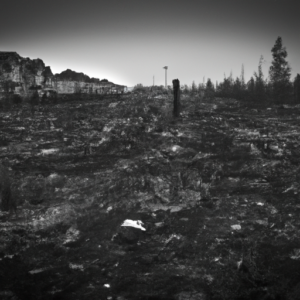The Canadian Opioid Crisis: An Underlying Wildfire in Society
In the shadow of cataclysmic events such as wildfires, sometimes other societal issues are overlooked. One such “underlying wildfire” is Canada’s opioid crisis, a problem that has silently but significantly been impacting communities across the country. In this article from the Times Colonist, the opioid crisis is brought into focus, highlighting the scale of its impact, the efforts made to combat it, and the challenges faced in doing so.
The Scale of the Opioid Crisis
The opioid crisis in Canada has escalated to a point where its impact is nearly as destructive as a physical wildfire. In British Columbia alone, the number of overdose deaths caused by opioids in the first half of 2021 already matched the total number for the whole of 2020 – a stark sign of the crisis’s acceleration.
Wide-Ranging Effects on the Community
The opioid crisis does not only lead to tragic fatalities; it also has wide-ranging ripple effects on the community. The rise in opioid use has been linked to increasing rates of homelessness and crime, thereby destabilizing neighborhoods and straining local resources. The opioid crisis has also added to the burdens on the healthcare system, as more individuals require emergency medical assistance and long-term treatment for addiction.
Combating the Opioid Crisis
Combatting the opioid crisis in Canada is no small task, as it requires concerted efforts from various stakeholders, including governments, healthcare providers, community groups, and the individuals affected by addiction. Several initiatives have been launched to abate the crisis, each tackling different aspects of the issue.
Canadian Opioid Abatement Class Action
A key initiative underway is the Canadian opioid abatement class action, a legal effort aiming to hold pharmaceutical companies accountable for their role in the opioid crisis. This represents a significant step in addressing the root of the crisis, as these companies are accused of misleading healthcare providers and the public about the addictive risks of opioids.
Naloxone Distribution and Training Programs
In addition, naloxone distribution and training programs are being implemented across the country. Naloxone is a medication that can rapidly reverse an opioid overdose, and equipping more individuals with this life-saving tool can help reduce the number of fatalities. These programs also include training on how to identify an overdose and administer naloxone effectively, further enhancing community resilience against the opioid crisis.
In the face of these efforts, however, the crisis continues to escalate. This highlights the need for more comprehensive, integrated strategies to prevent opioid misuse, support those affected by addiction, and address the societal impacts of the opioid crisis.
Key Points
- The opioid crisis in Canada continues to worsen, with the number of overdose deaths in British Columbia in the first half of 2021 already equalling the total for 2020.
- Increased opioid use has been linked to growing rates of homelessness and crime, placing additional strains on communities and public services.
- The Canadian opioid abatement class action is an important step towards holding pharmaceutical companies accountable for their role in the opioid crisis.
- Naloxone distribution and training programs are critical in reducing fatalities from opioid overdoses, but their implementation needs to be part of a larger strategy.
In Summary
The opioid crisis in Canada is a complex, multifaceted problem, akin to an underlying wildfire threatening the very fabric of our communities. It is a crisis that requires urgent, comprehensive action, as shown by its escalating impact and the varied efforts underway to combat it. As the Canadian opioid abatement class action and naloxone distribution and training programs illustrate, the fight against the opioid crisis is multifaceted, requiring legal, medical, and community-based responses. But above all, it is a fight that needs to be prioritized, for the sake of all Canadians affected by this crisis.
